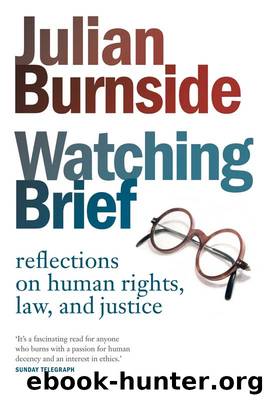Watching Brief by Julian Burnside

Author:Julian Burnside
Language: eng
Format: epub
Tags: Human rights., Justice, Administration of., Ethics., Law.
Publisher: Scribe Publications Pty Ltd
Published: 2011-08-14T16:00:00+00:00
-11-
Human Rights and International Law
[June 2005]
for as long as nations have traded with each other, their interactions have highlighted the need for some measure of agreement about the rules which govern that interaction. For example, piracy was recognised early as a threat to all trading nations, and was accepted as a crime punishable in any jurisdiction to which the pirate could be brought. This was the earliest example of international agreement conferring what would later be called universal jurisdiction. Enlightened self-interest coupled with recognised reciprocity has always been an effective formula for co-operation.
In 1941, not long after America had been drawn into World War II, Churchill and Roosevelt met aboard the US flagship Augusta and reached agreement on ‘certain common principles in the national policies of their respective countries on which they based their hopes for a better future for the world’. The Atlantic Charter, which was signed on 14 August 1941, set out principles that have provided an effective foundation for international rules until very recently. The Charter of the United Nations later adopted substantially similar principles which can be reduced to three central pillars:
1. A prohibition on the use of force in international relations except in self-defence, or where authorised by the community of nations;
2. A commitment to maintain the equal and unalienable rights of all members of the human family; and
3. Liberalisation of trade between nations.
The first of these pillars was later reflected in the Charter of the Military Tribunal which tried the major German war criminals at Nuremburg: they were charged with conspiring to wage aggressive war.
The second pillar was reflected in other charges tried at Nuremburg (conspiracy to commit crimes against humanity) and, especially, in the human rights instruments which were adopted after the war by most nations: the Universal Declaration of Human Rights, the Genocide Convention, the Geneva Convention relative to the Treatment of Prisoners of War, the Refugees Convention, the International Covenant on Civil and Political Rights and, more recently, the Convention against Torture.
The third pillar was reflected in the creation of various trade treaties, trade organizations, and trading blocs: for example the General Agreement on Tariffs and Trade and the North-American Free Trade Agreement; the International Trade Organisation and the World Trade Organisation; the European Common Market and, later, the European Economic Community and the European Union.
Increasing global interdependence, and a growing recognition that activity in one place can have global environmental consequences, led to international treaties concerning the environment, especially treaties concerning biodiversity, the ozone layer, and the global climate system.
Concern for the environment is not necessarily borne of altruistic concern for future generations. As early as the 1880s, the USA was concerned that its lucrative fur-seal trade was in danger because the seals were being killed on the high seas during their migration across the Bering Sea to Alaska. British sealers were taking the seals, with devastating consequences for their numbers. America brought the dispute for decision by a panel of arbitrators chaired by the King of Norway. Britain argued for freedom of action on the high seas.
Download
This site does not store any files on its server. We only index and link to content provided by other sites. Please contact the content providers to delete copyright contents if any and email us, we'll remove relevant links or contents immediately.
| Africa | Americas |
| Arctic & Antarctica | Asia |
| Australia & Oceania | Europe |
| Middle East | Russia |
| United States | World |
| Ancient Civilizations | Military |
| Historical Study & Educational Resources |
The Memory Code by Lynne Kelly(1945)
Schindler's Ark by Thomas Keneally(1514)
Kings Cross by Louis Nowra(1463)
Burke and Wills: The triumph and tragedy of Australia's most famous explorers by Peter Fitzsimons(1162)
1914 by Paul Ham(1093)
The Falklands War by Martin Middlebrook(1062)
Code Breakers by Craig Collie(1006)
Watkin Tench's 1788 by Flannery Tim; Tench Watkin;(993)
The Secret Cold War by John Blaxland(987)
Burke and Wills by Peter FitzSimons(986)
Paradise in Chains by Diana Preston(982)
A Farewell to Ice: A Report from the Arctic by Peter Wadhams(968)
The Protest Years by John Blaxland(945)
The Lucky Country by Donald Horne(908)
30 Days in Sydney by Peter Carey(873)
The Land Before Avocado by Richard Glover(861)
Lucky 666 by Bob Drury & Tom Clavin(845)
Not Just Black and White by Lesley Williams(833)
Great South Land by Rob Mundle(814)
